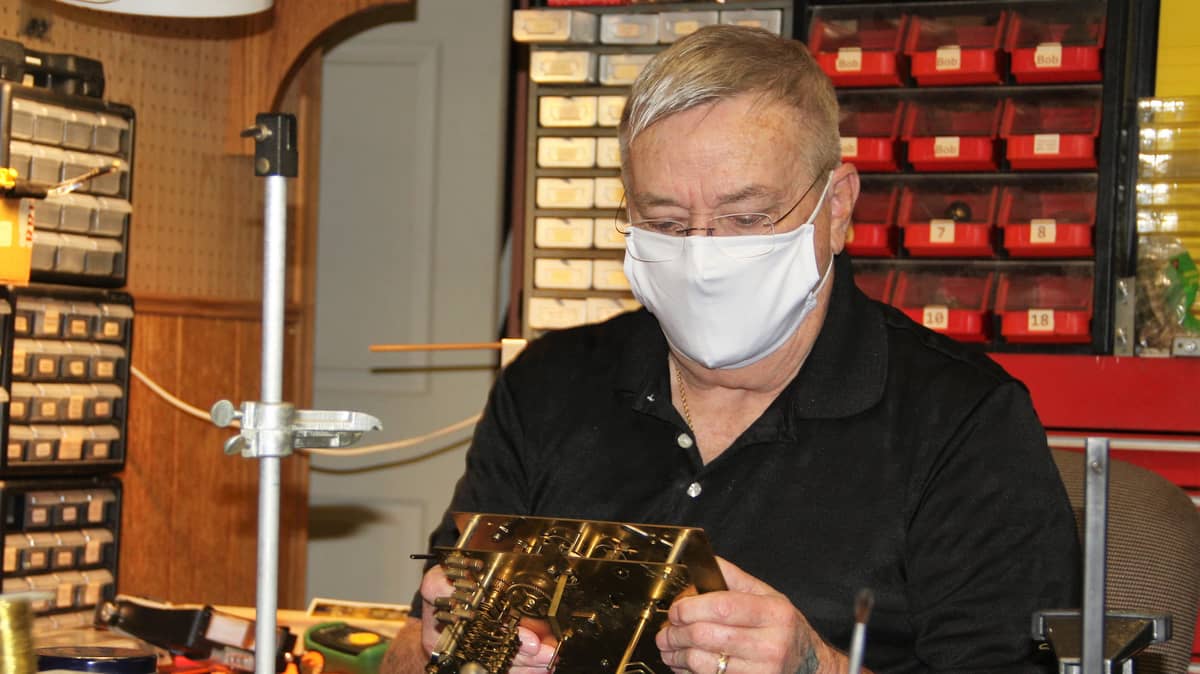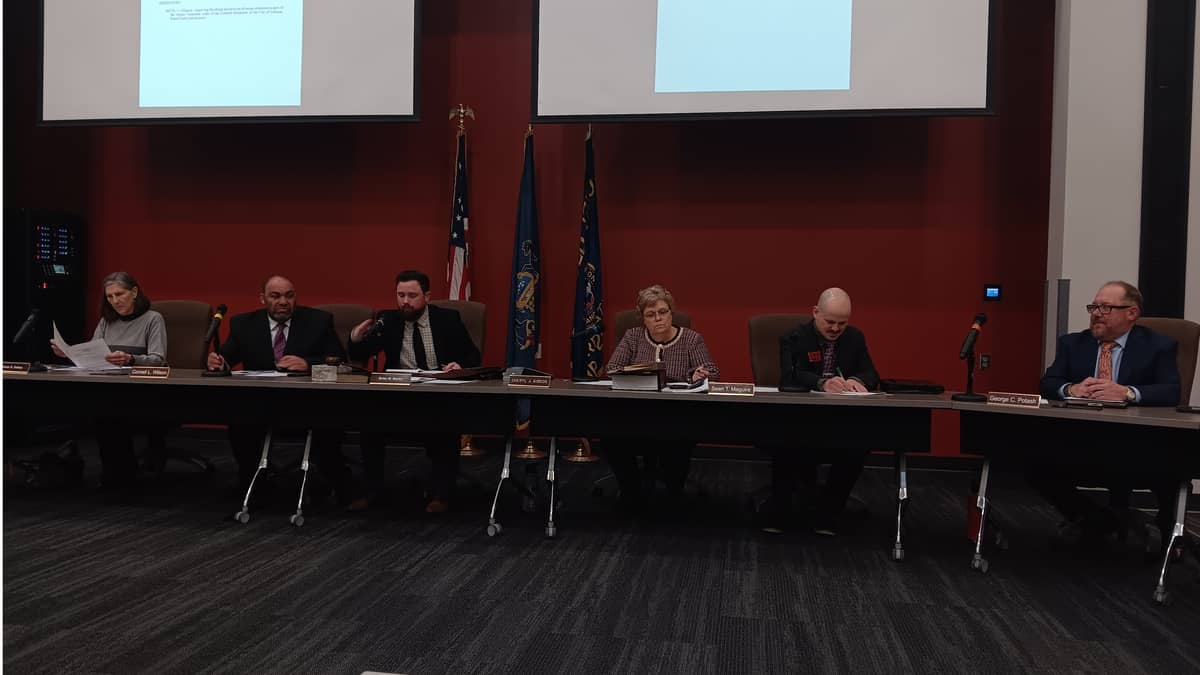A recent LebTown article about three downtown Lebanon clocks that aren’t continually running stirred up quite the reaction among local residents. While it seems like everyone had an opinion on those public clocks in disrepair, those opinions were widely varied.
Some said those public clocks reflected poorly on the current shape of the downtown business district. Some suggested that keeping track of time was more a generational thing, that technology has made public clocks unnecessary. Others said they appreciated the clocks’ presence and aesthetic value more than their functionality.
Henry Smith is a local clock repairman whose passion for clocks produces strong opinions about them. Not only does Smith find clocks aesthetically pleasing, he also sees their functionality as beautiful.
“I do like seeing them up there, but they should work,” said Smith, a 73-year-old lifelong resident of Lebanon. “You lose your history. They’re still attractive. They’re still appealing. They still look nice. But I think they should work. But I don’t know if you can force the owners to make them work.
“I think it does reflect poorly on the downtown,” Smith continued. “People don’t even sweep the sidewalks in front of their stores any more. I just don’t understand it. It’s a sign of letting your town look run down. It’s about having pride in your town.”

Smith, who’s been working on and repairing local clocks for more than 26 years, does have some first-hand knowledge of the public standing clock located in the 9th Street parking lot behind the Farmers Market building. He repaired that clock in 2014 and it worked for a number of years, but Smith said he does not know when it stopped working again.
Smith said he still has the invoice for the work on that clock, and that he billed the owner $80 for his repair services at that time.
“It wasn’t working and the manager of the Farmers Market contacted me,” said Smith. “I told her, ‘I’ll take a look at it and see what I can do.’ I did some research on the clock before I got there, and got it working. Somewhere along the way, the market was sold and the clock stopped working. It worked for a couple of years after I worked on it. It’s an antique clock, but it has a computer system in it.
“[The cost of fixing it now] all depends on what’s wrong with it this time,” continued Smith. “It could be $200. It could be $500. As far as I know, the manufacturer of that clock is still in business. I’m thinking the man who purchased [the Farmers Market building] called me and said something was missing. But I think he was just seeking information.”

Smith said he never worked on the clock at 760 Cumberland Street or the one above the front entrance of the Farmers Market building at 35 South 8th Street, and declined to estimate the costs involved in repairing them. But almost certainly, the costs involved is a large factor in repairing clocks which haven’t worked in years.
“It could be very expensive,” said Smith. “A lot of these companies are out of business. You might have to send a motor off to be rebuilt. I think money is a part of it, and a lack of interest as a community. I have the same issues with my clocks. I think this generation just isn’t interested in them.
“I’m assuming the owners have the right not to fix them at all, take them down and put them in a barn,” added Smith. “I personally think it’s wrong to have those clocks not working. If they’re not working, they’re not attractive.”
If it were up to Smith, all clocks would be in working order. He’s been tinkering and learning and repairing clocks since 1994, and his hobby turned into a passion after he retired from H. B. Reese’s, the candy manufacturer, 13 years ago.
“I’ve been into mechanics all my life,” said Smith. “I worked on cars when I was younger. I was a mechanic at Reese’s. Clocks are basically machines. It kind of all fell in line. I have a distinct love for handmade clocks, especially the Lebanon, PA clocks.
“Yes, some are very difficult to work on,” Smith added. “You get clocks that strike the hour, they strike a bell or rod, and they’re more difficult to work on. Then you have clocks that strike the half-four or every 15 minutes, and they’re even more difficult. Some play music. The more complications you put into a clock, the more difficult they are to work on.”
Smith owns more than 50 clocks, many of which keep time. Included in his collection are nine rare Lebanon, PA clocks, which a novice might refer to as ‘Grandfather’ clocks.

Lebanon, PA clocks were made by 14 local clockmakers from the early 1700s to the mid 1940s, with a high degree of craftsmanship. Not many of them still remain and there exists no definitive records of how many were originally constructed.
“Yeah, I’m usually on time,” said Smith, with a clock chiming in the background. “It’s a habit. I’ve had customers say to me, ‘you must be a school teacher,’ because I was punctual. It’s just the way I am. Clocks to me are fascinating, as far as the workmanship goes. They weren’t made in an assembly line.
“From the day we’re born, we’re dying. That’s time,” continued Smith. “We only have so much time. For me, I don’t look at clocks so much for the time. It’s more for the music or to see an attractive looking clock. It’s more the beauty of it. The calmness of it.”

Clocks may need time, but time doesn’t need clocks. Clocks are a human invention. Smith knows about clocks, so therefore he knows about time.
“I grew up working on mechanical things,” concluded Smith. “To think about a clock and what it does, and to be able to do that with nothing more than gears and levers, it’s fascinating. They have calendars built into them, so they know the moon phases and the day of the week. These clocks are 200 years old, and they can keep time within a minute a week.”
In that way, clocks are the perfect combinations of style and substance.
Questions about this story? Suggestions for a future LebTown article? Reach our newsroom using this contact form and we’ll do our best to get back to you.

Build the future of local news.
Cancel anytime.
Monthly Subscription
🌟 Annual Subscription
- Still no paywall!
- Fewer ads
- Exclusive events and emails
- All monthly benefits
- Most popular option
- Make a bigger impact
Already a member? Log in here to hide these messages
Free local news isn’t cheap. If you value the coverage LebTown provides, help us make it sustainable. You can unlock more reporting for the community by joining as a monthly or annual member, or supporting our work with a one-time contribution. Cancel anytime.

























